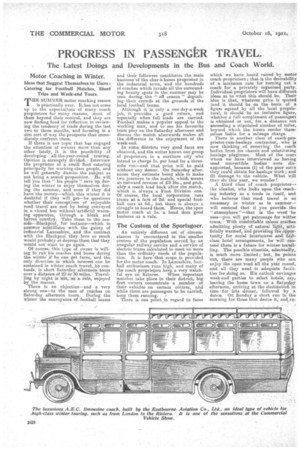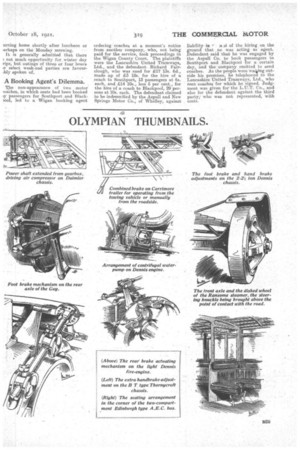PROGRESS IN PASSENGER TRAVEL.
Page 24

Page 25

If you've noticed an error in this article please click here to report it so we can fix it.
The Latest Doings and Developments in the Bus and Coach World.
Motor Coaching in Winter.
Ideas that Suggest Themselves to Users : Catering tor Football Matches, Short Trips and Week-end Tours.
T"suMMER motor coaching season is practically over. It has net come up to the expectations of many coach proprietors for many reasons, most of them beyond their control, and they are now finding food for reflection in reviewing the tendency of trade during the last two Or three mouths, and focusing; in a dim sort of way the prospects that immediately confront them.
If there is one topic that has engaged the attention of owners niore than any other lately, it is the possibility of developing all-the-year-round touring. 'Opinion is strangely divided. Interview the proprietor of a small fleet catering principally for working-class people, and he will generally dismiss the subject as not being a sound proposition. He will tell you that " his people" save up during the winter to enjoy themselves during the summer, and even if they did have the money—which this winter it is doubtful if they will get—he questions whether their conceptions of enjoyable read travel are met by being conveyed in a closed bus without [artificial warming. apparatus, through a bleak and barren 'country. Take them to the seaside----BladkpOol, for instance—which in suramer Scintillates with the gaiety of industrial Lancashire, and the contrast with the Blackpool they • love so much would probably 'so depress them that they would not want to go again.
Of conree, this type of owner is willing "VO rurs his coaches lahd buses during the winter ifhe can get fares, and the only direction: iMWhich interest -can be suatained-in teach travel', ha contends, is short Saturday aftertioonst.ours over a distariceof 20 or 30 miles." Travelling by nighteis ttbt,,a,ii a ink', enjoyed
• by the masses. There is an objection—and a very strong one—to the uses of coaches on Saturday afternoon tours. During the winter the conveyance of football teams arid their followers constitutes the main business of the char-a-banes proprietor in the industrial town, and the hundreds of coaches which invade all the surrounding beauty spots in the summer may be seen during the " off season " depositing their crowds at the grounds of the local football teams.
Although it is only a one-day-a-week job, it. provides a good return, and especially when full loads are carried. Football makes a popular appeal to the working man, and to see his favourite team play on the Saturday afternoon and discuss the match afterwards makes alt the difference to the enjoyment of the week-end.
In some districts very geed fares are obtained, and the writer knows one group of proprietors in a northern city who intend to charge isper head for a threemile run—and that price will he . paid without any demur. On Saturday afternoons they estimate being able to make two journeys to the match, which means an outward revenue of £2 Ifs., and probably a coach load back after the match, which is always a First Division one. Of course, the local corporation runs trams at. a fare of 2d. and special football ears at 6d., but there is always a struggle to board them. Hence, the open motor coach at le. a head does good business as a rule.
The Custom of the Sport sgoer,
An entirely different set. of ...circumstances is encountered in the smaller centres of the population served by an irregular railway Service and a service of electric trams caleulated to meet no more than the ordinary needs of the population. It is here that -scope is provided for the motor coach. In Lancashire, football enthusiasm runs high, and many of the coach proprietors keep a very watch
ful eye on fixtures. When important matches take place in their district, big fleet owners concentrate a .number of their vehicles on certain centres, and while there are passengers to be carried, keep them running.'
There is one point in regard to fares which we have heard raised by motor coach proprietors ; that is the desirability of a. minimum rate for turning out a coach for a privately organized party. Individual proprietors will have different idoas as to what this should he. Their idea is that, whatever price is quoted 'and it should be on the basis of a figuse agreed by all the local proprietors), it should 'be an inclusive figure, whether a full complement of pas,sengers is obtained or not, for a distance not exceeding a stipulated number of miles, beyond which the hirers render themselves liable fo'r a mileage charge.
There is another class of coach-proprietor-cum-haulage contractor, who'is now thinking of removing the coach bodies from his chassis and substituting haulage platforms. Most of the users whom we have interviewed as having used convertible bodies were disappointed, because {I) of the poor rates they could obtain for haulage work; and 12) damage to the vehicle. What will they do this year, we wonder ?
A third class of coach proprietor—. the idealist, who looks upon the coaching industry as a trade in itself, and who believes that road travel is as necessary in winter as in -summer— will contend that if you provide, the "atmosphere "that is The Word be uses—you Will get patronage for tinter tours. With ceitifortab le. saloon". -Coaelies admitting plenty of natural Tight artificially:warnied, and providing the Opportunity for social :intercourse and flit class hotel arrangements, bewill .,oØstend there is a future 'for winter tree-alb:lg. The possible clientele, admittedly, is much more limited; but,. he pisints out, there are many people Who can enjoy the open -road' all the Year round, and all .they need, is adequate facilities for doing so. His outlook envisages week-end parties to select hotels, say, leaving the home town on a Satorday afternoon,arriving at the destinatiofi. in time for late dinner, followed by a dance. On Sunday a short run in the morning for these that desire it, and re
tuning home shortly after luncheon or .erhaps on the Monday morning.
It is generally admitted that there not much opportunity for winter day rips, but outings of three or four hours ir select week-end parties are favourbly spoken of
A Booking Agent's Dilemma.
The non-appearance of two motor • oaches, in which seats had been booked oy passengers for Southport and Blackmei, led to a Wigan hooking agent ordering coaches at a moment's notice from another company, who, not being paid for the service, took proceedings in the Wigan County Court. The plaintiffs were the Lancashire United Tramways, Ltd., and the defendant Richard Fair. dough, who was sued for £17 13s. 6d., made up of £3 18s for the hire of a coach to Southport, 13 passengers at 6s. each, and £14 Ids., less 5 per cent., for the hire of a coach to Blackpool, 29 persons at 1.0s. each. The defendant claimed to be indemnified by the Aspull and New Springs Motor Co., of Whelley, against liability-in • it a of the hiring ou the ground that fie was acting as agent. Defendant said that he was engaged by the Aspull Co. to book passengers to Southport and Blackpool for a certain day, and the conipany. omitted to send coaches. As the people were wailing outside his premises, he telephoned to the Lancashire United Tramways, Ltd., who sent coaches for which he signed. Judgment was given for the L.U.T. Co., and also for the defendant against the third party; who was not represented, with costs.
































































